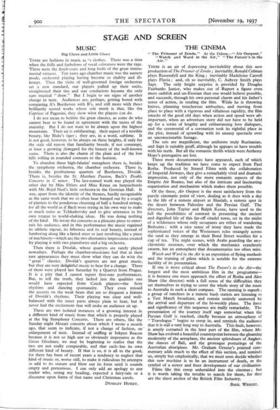THE CINEMA
" The Prisoner of Zenda." At the Odeon.—" Air Outpost," " Watch and Ward in the Air," " The Future's in the Air."
THERE is an air of depressing inevitability about this new production of The Prisoner of Zenda ; inevitably, Ronald Colman plays Rassendyll and the King ; inevitably Madeleine Carroll plays Flavia ; and, oh so inevitably, C. Aubrey Smith plays Sapt. The only bright surprise is provided by Douglas Fairbanks Junior, who makes out of Rupert a figure even more caddish and un-Etonian than one would believe possible, and succeeds, through his own personal charm and his father's sense of action, in stealing the film. While he is throwing knives, planning treacherous ambushes, and moving from place to place with a vigorous and villainous rapidity, the film smacks of the good old days when action and speed were all- important, when an adventure story did not have to be held up for a series of lengthy and embarrassing love dialogues, and the ceremonial of a coronation took its rightful place in the plot, instead of sprawling with its uneasy spectacle over an unconscionable footage.
The sets are magnificent, the uniforms truly Ruritanian, and Sapt is suitably gruff, although he appears to have trouble with his teeth. But all the romantic thrills which were Anthony Hope's prerogative are lost.
Three more documentaries have appeared, each of which keeps_ up the tradition we have come to expect from Paul Rotha. Produced by Strand Films with the collaboration of Imperial Airways, they give a remarkably vivid and dramatic impression, not only of the more romantic aspects of the Empire Air Routes, but also of the intricate and fascinating organisation and mechanism which makes them possible.
Of the three, Air Outpost is the most satisfactory from the purely cinematic point of, view, dealing as it does with a day in the life of a remote airport at Sharjah, a remote spot in the desert between Palestine and the Persian Gulf. The directors, John Taylor and Ralph Keene, have used to the full the possibilities of contrast in presenting the ancient and dignified life of this far-off citadel town, set in the midst of a wilderness whose only occupants are tribes of wandering Bedouins ; with a nice sense of irony they have made the sophisticated voices of the Westerners echo strangely across the sand as they emerge in their Bond Street woollies for a cup of tea. The night scenes, with Arabs guarding the ana- chronistic monster, over which the mechanics ceaselessly swarm, has an atmosphere that documentaries too often miss.
Watch and Ward in the Air is an exposition of flying methods and the training of pilots which is notable for the extreme lucidity of its presentation.
If one is more critical about The Future's in the Air—the longest and the most ambitious film in the programme— it is because one must approach the effort of Rotha and Alex Shaw (the director) with a full sense of the difficulties they set themselves in trying to cover the whole story of the route to Australia in such a short compass. The opening is superb ; a group of ranchers in a remote bush station are listening to a Test Match broadcast, and remain entirely unmoved by the arrival and departure of the bi-weekly plane. The force and significance of this sequence are really remarkable. The presentation of the journey itself sags somewhat when the Persian Gulf is reached, chiefly because an atmosphere of " Travelogue " begins to creep in, and reminds the audience that it is still a very long way to Australia. This fault, however, is amply corrected in the later part of the film, where Mr. Shaw has evolved a beautiful counterpoint between the gleaming modernity of the aeroplane, the ancient splendours of Angkor, the dances of Bali, and the grotesque posturings of the Australian aborigines. Mr. Graham Greene's pointed com- mentary adds much to the effect of this section, and reminds 'us, simply but emphatically, that we must soon decide whether this new machine is to be an instrument of death, or the symbol of a newer and freer development of our civilisation.
Films like this creep unheralded into the cinemas ; but it is worth taking the trouble to search for them, for they are the sheet anchor of the British Film Industry.
BAsu. WRIGHT.
















































































































 Previous page
Previous page